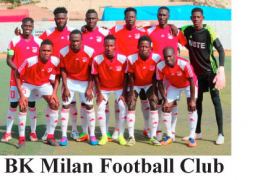
150 male and female youths were the targets of the three-day training towards the abandonment of female genital mutilation (FGM) and other harmful traditional practices (HTPs).
They included children and young mothers who are at risk of such HTPs and some who are already victims and survivors of such practices.
The training programme, funded by UNFPA, is a joint UNFPA/Gambia Government Country programme which is being implemented by GAMCOTRAP through advocacy campaigns for the elimination of FGM in the one generation.
At Jawlaba cluster, the Chief of Niamina West, Nganyi Dampha, was represented by Wandifa Dampha of Pinai, who advised participants to make the best use of this opportunity in representing their communities and fellow young people, in particular to get the right information to disseminate to others.
He acknowledged that they learnt a lot from the Community Leaders training and felt empowered with the information and hopes that the training, focused on youth, will be more fruitful.
Similarly, the Deputy Imam of Sutukung, Oustass Baba Kanagie, supported by other religious scholars from Mamud Fana and Jarreng, informed the Niamina youths that FGM is not an Islamic obligation but a traditional practice upheld by people.
He pointed out that there is evidence of the negative effects it has on women and girls and that they should not associate it with Islam.
They were asked to reflect on the fact that, if a woman is not circumcised, it does not affect her religion.
The youths were called upon to seek knowledge to be better equipped to serve as change agents addressing harmful practices.
During the programme, the young people were encouraged to respect the rights of their sisters as they are the adults of the future.
They were enlightened about the rights of women and the legal context in which women are protected and exposed them to the Women’s Act 2010, which incorporated international and regional commitments The Gambia has ratified to protect and promote the rights of women and girls, such as CEDAW and the Maputo Protocol.
The youths were further sensitized on the importance of education as a tool to enlighten them about their rights.
They were informed that education is a tool through which women can take a leadership role in society and effectively contribute to the development of the country.
The four principles of the Convention on the Rights of the child (CRC) were discussed and it focused on the best interest of the child, non-discrimination, life, survival and development, and participation.
Testimonies from young people
Giving his testimony at the end of the training, youth representative Alhajie Camara from Kudang said he attended the training at Mamud Fana with skepticism that FGM cannot stop, but he has now concluded that “Truly the picture and the video I saw here really make me sad, I totally believein itnow. If you guys didn’t play this here I would never believe it.Now we understand the effect it brings. Definitely this picture and the video really make me sad.It’s clear to me and I will advocate for it, I will tell people the bad effect it causes to our girl child. If you guys didn’t play this video I would never believe you because I had never supported the campaign against FGM.The presenter hasexplained it very clearly and it really touched my heart I must confess.”
Similarly, a young teenager from Jareng, Jainaba Jaiteh who participated in the training from Niamina East, said it was the first time she was exposed to reproductive health information and the negative effects of FGM during childbirth.
She asserted that before coming to the training, she was made to believe that if a woman is not circumcised she cannot deliver a baby, but her exposure has enlightened her. “I thought if you didn’t go through Female Genital Mutilation, you would never give birth, but now I know that it is not good and even if you don’t do it you will give birth; that’s not a problem. If anybody circumcises any child you will have a problem; if the person happens to die you will be responsible for it.”
The reflections have revealed that in all the three Niamina districts, it was observed that ignorance is key in perpetuating harmful practices.
Participants were further exposed to the health effects of FGM which left a big impact on the minds of the participants.
The impact of FGM on women’s reproductive health and rights were validated by the Health Officer in Charge of Dankunku Health Centre. Mr Marenah affirmed the negative effects of the practice, which he noted poses challenges to maternal and child health.
The three-day training exposed young people to issues relating to the dynamism of culture, gender and the rights-based approach, as well as addressing negative interpretations relating to traditional practices which are regarded as religious issues.
They were exposed to the health effects of FGM and this empowered them to come to consensus calling for an end to the practice.
Meanwhile, GAMCOTRAP is also engaging young people through community sensitization as part of the 19 Days of Activism on violence against children and young people.
Issues of concern to young people raised during the campaign included heavy workload on girls, forced and early marriage, rape, FGM, and lack of education, all of which were cited by the young people.
Many adults are concerned that girls are married early because of the fear of getting pregnant thus creating a setback for the opportunity to complete their education.
However, some of the young people said some girls get pregnant due to poverty.
It was noted that while seeking assistance for basic things they need to go to school, such as school lunch, some men and boys take advantage of them and rape them or give them assistance in exchange for sex. This is very important for parents to take note of.
During radio live panel discussions on Brikamaba Community Radio and Paradise FM, some callers blamed girls for getting pregnant because of their dress codes.
It should be noted that blaming one another will not solve the problem but we should understand that it is the responsibility of all stakeholders and duty bearers in society to respect, protect and promote the rights of women and children.
The principle of youth participation in decision-making cannot be real if they are not informed to effectively participate in decisions affecting their lives.
Therefore the training activities focusing on youth is to empower them to engage in promoting their rights in development as citizens.
Read Other Articles In Article (Archive)
GCAA economic crime case resumes
Mar 9, 2010, 1:03 PM



